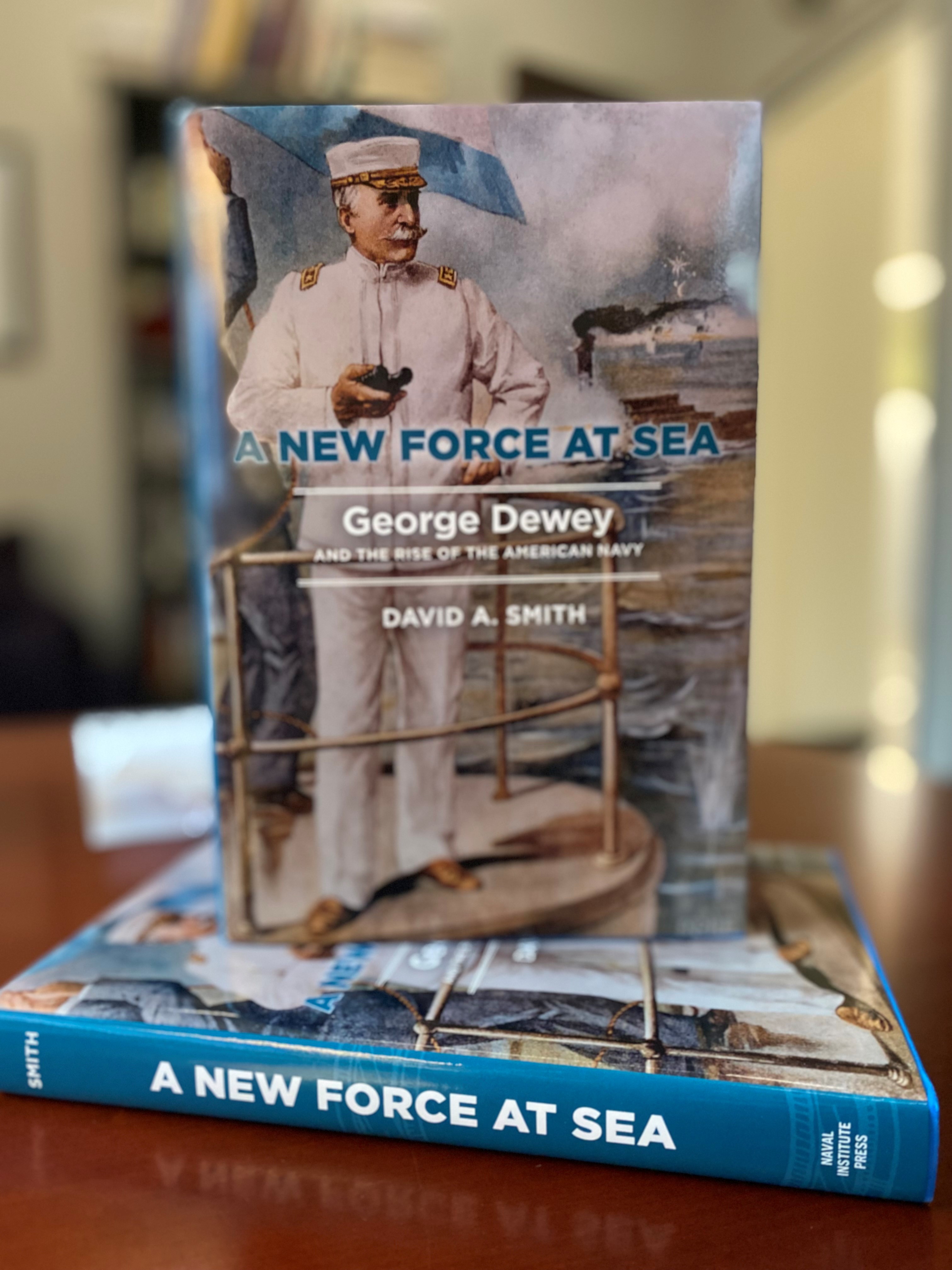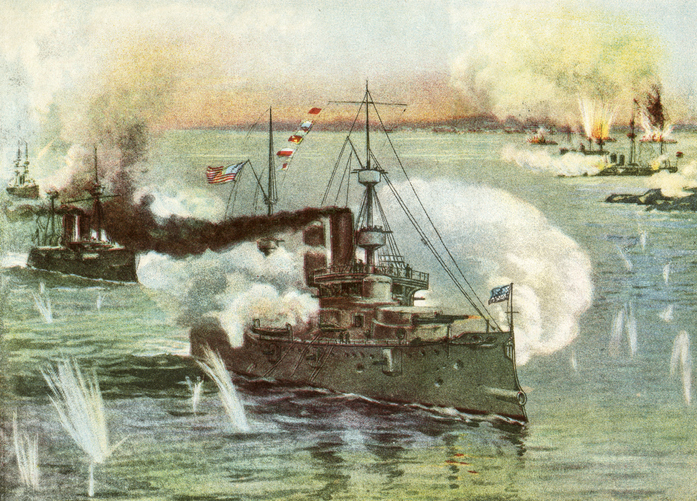Baylor Expert: On Its 125th Anniversary, the Battle of Manila Bay Had a Lasting Impact on U.S. Diplomacy
Military historian and author David A. Smith discusses the role of Admiral George Dewey in the historic battle
Contact: Kelly Craine, Baylor University Media and Public Relations, 254-297-9065
Follow us on Twitter: @BaylorUMedia
WACO, Texas (May 1, 2023) – May 1 marks the 125th anniversary of the Battle of Manila Bay – the first battle of the Spanish-American War. A short but decisive battle, it was one of the most complete military victories in United States history and would transform the U.S. into a global power.
Commodore George Dewey, the leader of the American squadron that defeated the Spanish fleet, instantly became the most famous American in the world and the embodiment of the new naval power of the country at the dawn of the 20th century.
Baylor University military historian David A. Smith, Ph.D., senior lecturer in history, is the author of A New Force at Sea: George Dewey and the Rise of the American Navy, published by the U.S. Naval Institute, which tells the story of one of the most important officers in the U.S. Navy between the Civil War and World War II.
The Spanish American War
Growing hostilities with Spain over its conduct in the Cuban War of Independence and the sinking of the USS Maine in Havana, Cuba, on Feb. 15, 1898, forced the U.S. to respond by declaring war April 25. The Philippines was chosen for the first attack from the U.S.
Dewey’s calm and cool order that opened the battle – “You may fire when you are ready, Captain Gridley,” became shorthand for the American spirit under fire, joining such well-known phrases like Farragut’s “Damn the torpedoes,” from the Civil War, and from the American Revolution, John Paul Jones’ defiant “I have not yet begun to fight!”
Within a few hours, the attack was over. Dewey and his squadron had destroyed the Spanish fleet and only one American had died in the battle. By August, the war was over. Spain ceded Guam, Puerto Rico and the Philippines to the United States as part of the Treaty of Paris.
Global impact
The Battle of Manilla Bay had lasting impact on U.S. diplomacy and world affairs for decades.
- The United States established itself as a global and colonial power.
- The U.S. Navy would grow to be the second largest naval force behind Great Britain.
- The U.S. access to foreign markets grew, ushering in a new era of world trade.
- Because of his service in Cuba as one of the “Rough Riders,” Theodore Roosevelt used his fame from the war to become governor of New York, and later, President of the United States.
- The U.S. would unexpectedly take a leading role in Asian and European affairs.
- The new American possessions (can we say territories or something other than possessions?) in the Pacific that came as a result of the war made the necessity of a Central American canal much more real and immediate in the eyes of the United States.
Legacy
In March 1899, the U.S. Congress honored Dewey by creating the rank of Admiral of the Navy, the highest rank ever held by a U.S. naval officer. He is the only person to ever hold the rank.
Capitalizing on his popularity, Dewey briefly ran for President in 1900. He soon withdrew from the race and supported President William McKinley, who was reelected. He was appointed to the new General Board of the Navy, the first strategic planning body in the Navy’s history and served until his death in 1917.
“George Dewey was at the foundation of the U.S. Navy’s expansion into the world at the outset of the 20th century,” Smith said. “He was the embodiment of its transformation from an institution that did little more than ensure American coastal defense to a modern force that today still projects and maintains American power around the globe.”
ABOUT THE AUTHOR
David A. Smith, Ph.D., is a senior lecturer in history at Baylor University. He holds a Ph.D. in modern American history from the University of Missouri. He has written books on American military, cultural and political history, including The Price of Valor: The Life of Audie Murphy, America's Most Decorated Hero of World War II, Money for Art: The Tangled Web of Art and Politics in American Democracy and George S. Patton: A Biography.
His columns on art, culture and politics have appeared in the Weekly Standard, The Wall Street Journal, The Dallas Morning News, Houston Chronicle, Austin American-Statesman and Waco Tribune-Herald.
He has been featured on NPR's Morning Edition, WNYC's "Soundcheck" and KERA's "Think," and he hosts a weekly art feature, “David and Art,” on KWBU-FM.
ABOUT BAYLOR UNIVERSITY
Baylor University is a private Christian University and a nationally ranked Research 1 institution. The University provides a vibrant campus community for more than 20,000 students by blending interdisciplinary research with an international reputation for educational excellence and a faculty commitment to teaching and scholarship. Chartered in 1845 by the Republic of Texas through the efforts of Baptist pioneers, Baylor is the oldest continually operating University in Texas. Located in Waco, Baylor welcomes students from all 50 states and more than 100 countries to study a broad range of degrees among its 12 nationally recognized academic divisions.
ABOUT THE COLLEGE OF ARTS & SCIENCES AT BAYLOR UNIVERSITY
The College of Arts & Sciences is Baylor University’s largest academic division, consisting of 25 academic departments in the sciences, humanities, fine arts and social sciences, as well as 11 academic centers and institutes. The more than 5,000 courses taught in the College span topics from art and theatre to religion, philosophy, sociology and the natural sciences. The College’s undergraduate Unified Core Curriculum, which routinely receives top grades in national assessments, emphasizes a liberal education characterized by critical thinking, communication, civic engagement and Christian commitment. Arts & Sciences faculty conduct research around the world, and research on the undergraduate and graduate level is prevalent throughout all disciplines. Visit the College of Arts & Sciences website.

